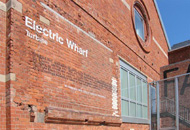Electric Wharf
Community Programme
Radford Primary School
Ashley McCormack lead on the outreach work with Radford Primary School and was artist in residence at the school for twelve weeks. The pupils were asked about the environment in which they lived and went to school and whether they knew there was an electricity plant and canal nearby. Some did not know about either of these things, so a site visit was set up by Ashley, Larry Priest and CDP for the children to learn about electricity production and the importance of the site in the history of Coventry.
Another learning route for the children was a masterclass with a journalist from the city's main local paper, the Coventry Evening Post. The children asked questions guided by Penny Wilkin from the neighbourhood renewal regeneration team and Ashley. The children learnt about the acquisition of interviewing techniques through this work and were also introduced to the concept of sustainability at a range of scales, from the recycling of magazine images in the collages they made to the reuse of building materials on the site itself. The children created a collage from the architect's 'artists impression' line drawing of the envisaged development; this image populated the buildings with activity and rendered the surfaces with imaginary materials. The interviews formed the basis of a newspaper report, which with images taken during the site visit and the collage, was printed as a double spread in a special issue of the Coventry Evening Post. The collage was then enlarged and installed as a billboard opposite the site. The collage is now permanently displayed in the school.
Another element of the Radford Primary School residency was a 'TV style presentation' of the children's involvement in the Electric Wharf project at the school assembly.
Custom-designed Wallpaper
To further visualise the sustainability aspects of the development Anna Sandberg from muf designed a wallpaper for the show flat composed of repeating patterns using images of the environmental ambitions of the project, for example solar panels, use of salvaged building materials, green roofs and grey water.
East Radford Learn Direct English Group
As a means to research perceptions of shared ownership of public space muf made links with the East Radford Learn Direct, "English as a Second Language" group, for first and second generation immigrants and refugees. The aim being to provide a structured programme to enable people to secure full time employment. The majority of those in the group had recently arrived in the area and had to create for themselves their own notion of "home". To circumnavigate written and verbal communication in English, collage and drawing were used to describe places of quiet and repose. These images were then used to create a design for the small overgrown verge at the end of the road opposite the site. Over a period of several weeks the group worked to clear the site and create planting beds for a field of sunflowers grown from seed by the group and children from Radford Primary School.
Evening Cruise
In April 2003 muf, in partnership with the City Council, organised an evening cruise on the canal that borders the development. Personal invitations were sent to members of the different constituents from the locality, these included children and staff from Radford Primary School, the Learn Direct English group and staff, former workers from the electricity plant and other derelict factories along the canal, existing and prospective residents, local community representatives involved in regeneration and private developers. In groups of 30, 200 people in total, boarded the barge and journeyed down the canal and listened to a narrated story that fabricated an imaginary history, based on research, some through interviews with former factory workers, of the buildings and views along the canal. The edges of the canal were further animated by performances and installations, for example, one building, described as the repository of C19th repetitive strain injuries, was filled with 134 mirror balls. Projections and an aerial performance by trapeze artists were located on another, and a brass band played on the site of an ancient cotton loading quay. These momentary transformations made space for people to have an alternative reading of the history of their immediate environment and so suggested that change is itself a process of first imagining. A community event was simultaneously held on the Depot side of the canal where the trip ended, with street theatre performers, professional aerialists and local specialist food suppliers, the evening's entertainment culminating in fireworks by 'Walk the Plank', Manchester based fireworks company.

